It was thirst that brought them out of hiding. Creeping from the bush, back to their village in search of water.
At the hottest point of the day, in the hottest season of the year, Richard dabs the sweat from his forehead and tells the story. And I can see her. It’s 2005. She’s pregnant and slow, carrying a two year-old so hungry that she does nothing but sleep.
The young mother tells the others to go ahead – she’ll catch up. She kisses her husband off into the darkness. He leads her mother and his brothers back to the home they were chased from by Joseph Kony’s rebels weeks before.
Later – I wonder how long it took her to walk the miles – she arrives at the village and finds her home smoldering, black, burned by rebels with her husband and his brothers locked inside.
A body lies motionless nearby. She stoops and rolls it over – her mother, beaten to death.
The beautiful seven year-old sitting under the shade tree with us today doesn’t remember that night. Colline has no recollection of the two months of captivity that followed either — she and her mother living in the bush, lugging military supplies from place to place to place, just surviving as slaves to Joseph Kony’s Lord’s Resistance Army.
Colline’s little sister saved her life – and her mother’s. After two months of slavery Colline’s mother was too pregnant to be of any use to Kony’s troops. So they abandoned her to give birth alone in the bush.
Colline was free. But not entirely. Not yet.
Poverty can’t always be photographed and counted. Sometimes it lurks invisible and immeasurable deep inside a child.
Richard is Colline’s uncle, a slight man who smiles easily and speaks softly under a lone shade tree in his yard. He works as a watchman at the local university. And he watched over Colline, her mother and the baby girl at his home in Lira after their escape.
One day Colline’s mother moved back to the village – Richard doesn’t say why and it feels cruel to press this hard-pressed family for an answer. What I do know is that Colline stayed behind with Uncle Richard, living with his wife and kids. Moving forward would be hard enough without going back.
Colline was a knot of anxiety and fear after her escape, shackled by events she couldn’t remember – still mastered by the trauma, uncertainty, and loss she experienced as a two year-old. And then her mother left?
Richard tells us that even before mother moved away Colline recoiled from crowds and sounds – the voices of family, children singing, a radio playing next door. She was frail, thin, exhausted. She sat quiet and alone, unable to play with other children, locked inside herself – a slave.
Then one day, when Colline was seven, Uncle Richard went to a church prayer meeting to ask God for help. And God answered.
Also attending the meeting that day was a woman who volunteered with Compassion International. She told the Compassion staff about Colline and soon Compassion workers visited Colline’s home to evaluate the level of poverty she was living in…and the poverty living within her.
Today Colline is eleven. She doesn’t sit alone anymore, no longer retreats at every sound. This afternoon she stands in a crowd of more than 100 children – and sings!
She sits in our circle of chairs in her brown and white school uniform talking with Emily in confident whispers.
Colline goes to school now and wants to be a nurse when she grows up. “I want to help people,” she beams.
Colline doesn’t hunt for food in the bush anymore. She eats every day and on Saturdays she goes to the Compassion Center (All Saints Boroboro Child Development Center #UG926) where she plays with more than 200 friends, enjoys a hot meal and a snack, is tutored in several subjects, gets medical attention, hears about and experiences the love of God. Each day freer than the one before.
Like all 65,000+ Compassion Child Development Centers around the world, the one serving Colline is a church – a church meeting the physical and spiritual needs of the poorest of the poor in the neighborhood around it. These churches set children free from hunger, hopelessness, fear, sickness – poverty.
It was thirst that brought Colline out of hiding and made her a slave. But she’s not thirsty anymore, not hiding or hungry, not afraid. Not a slave.
Release a child from poverty for $38/month. A small price for freedom.
 Shaun Groves
Shaun Groves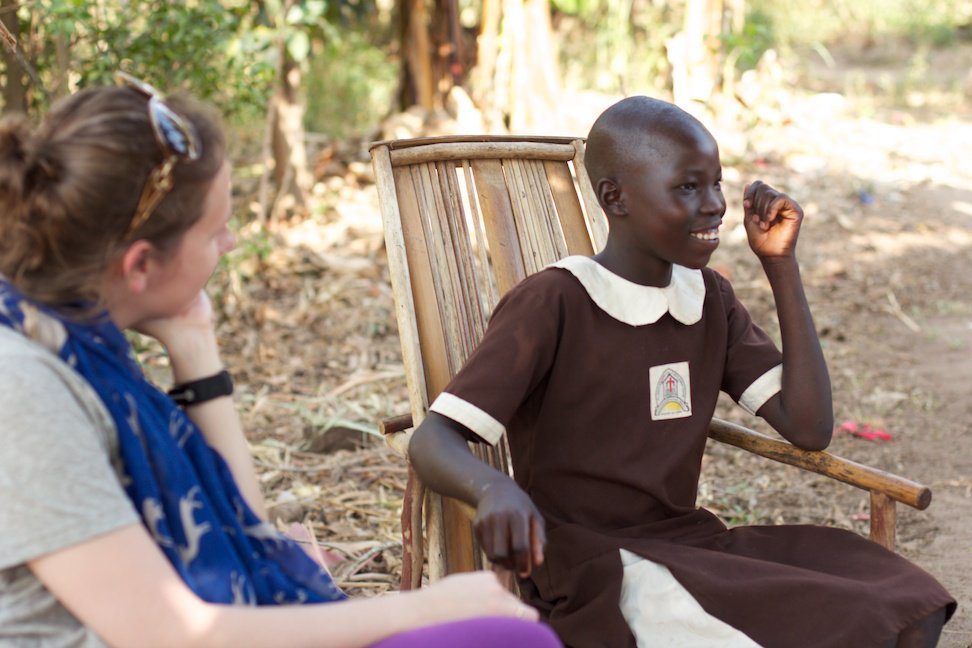
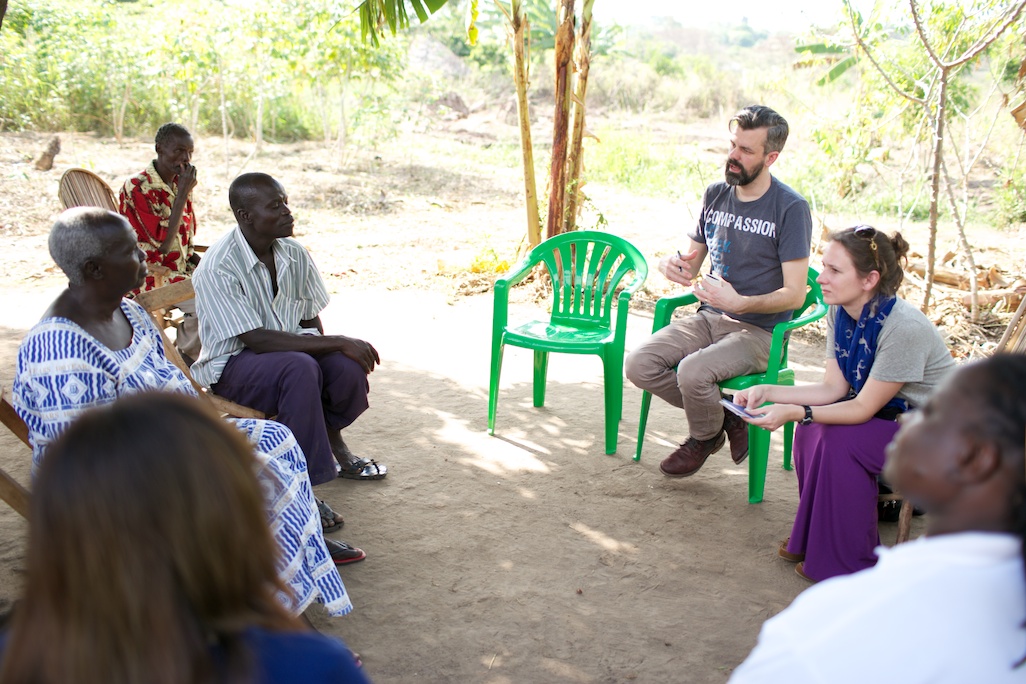
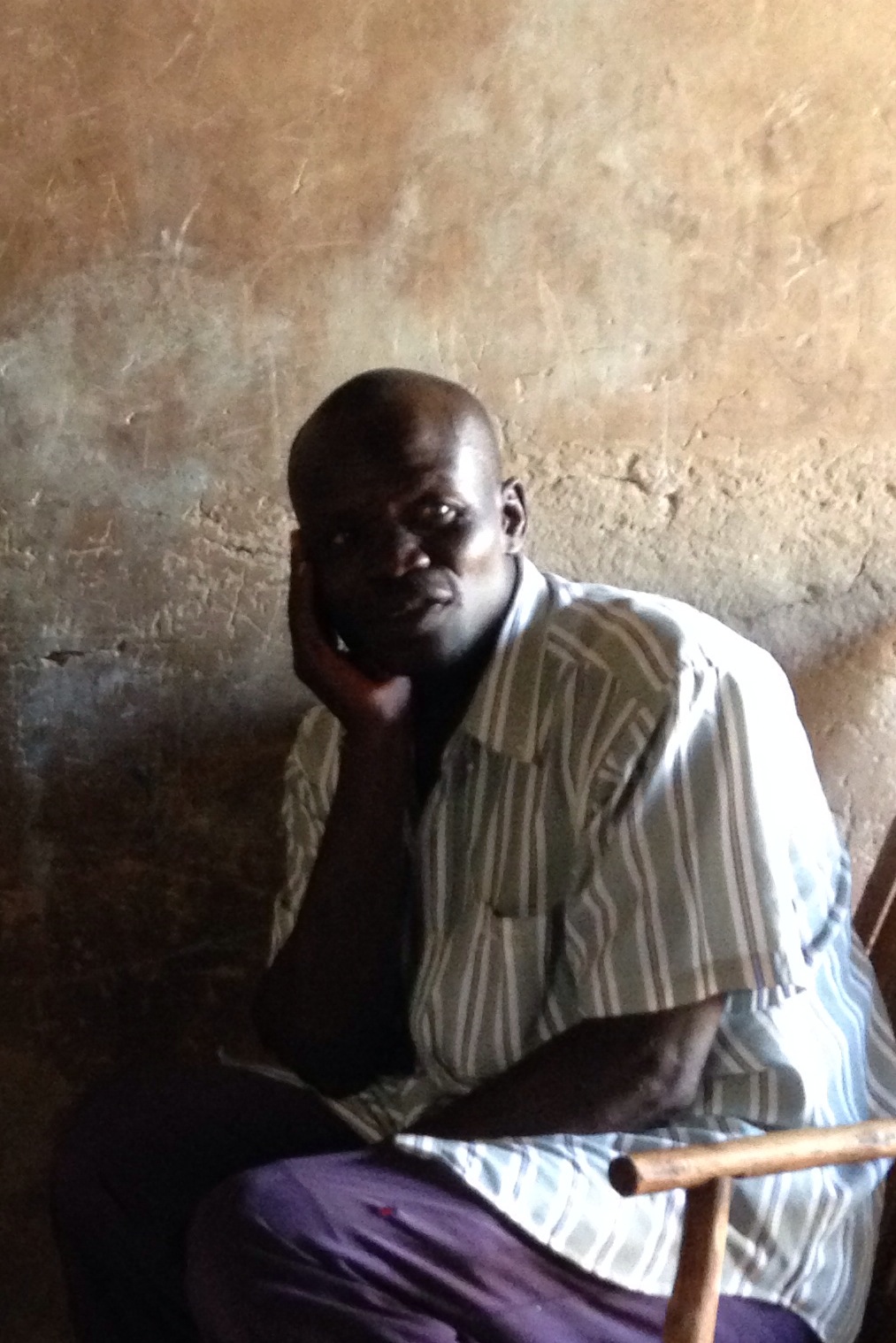


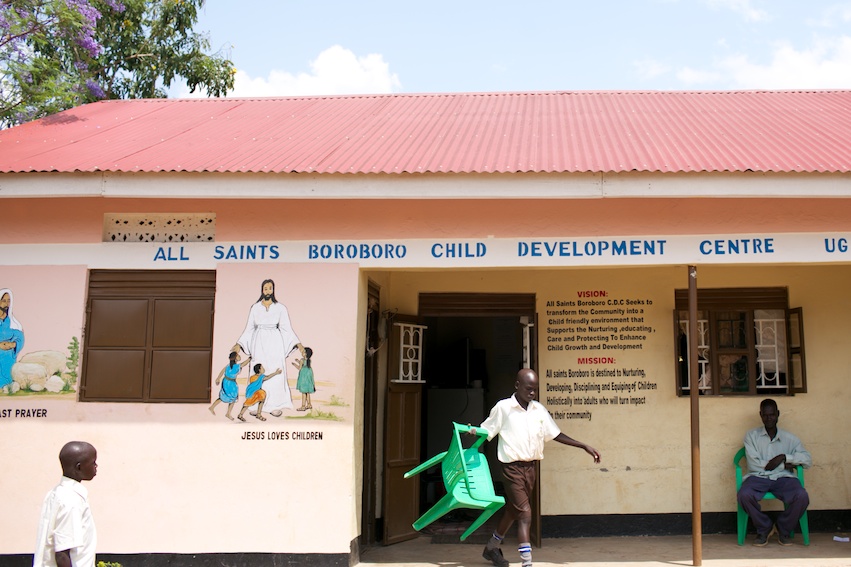
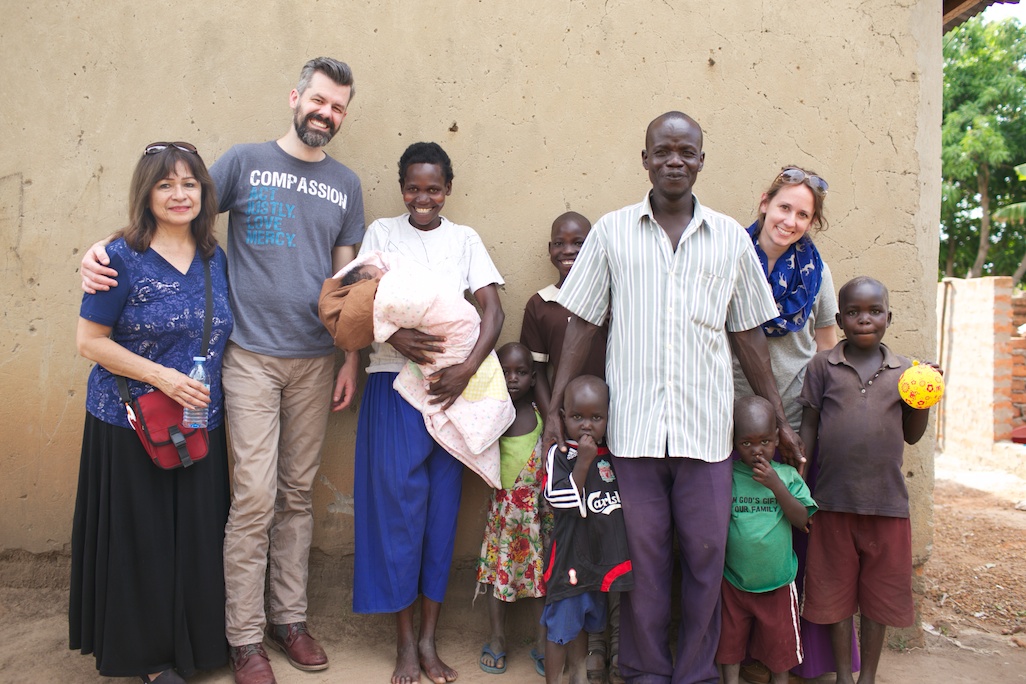
Michele-Lyn Ault says:
“Each day freer than the one before…Setting children free from hunger, hopelessness, fear, sickness – poverty.”
Amen, amen, amen. Grateful for people who dreamed it possible, and made it possible for others to live.
Shaun Groves says:
Me too. Thanks for following along, Michele.
Lindsay says:
“Compassion center workers visited Colline’s home to evaluate the level of poverty she was living in…and the poverty living within her.”
This is why our family chooses to partner with Compassion. So perfectly stated. We are not trying to eradicate poverty from the world. We are trying to eradicate poverty from one child’s life (many children’s lives) so their tummies will quit grumbling and their fears will quit mumbling long enough for them to hear God say, “I love you, child. You are an incredible treasure, and I will always be here with you and for you.”
Kelly says:
What a powerful picture of His provisions and love. One of the many stories if why compassion is so important. Thanks for what you do. 🙂
Kelli says:
So I started with Nester’s post, then moved to Emily, then on to Joy’s and Jeff’s, and finally ended with yours.
I’m a mess.
I am praying for you all every single day. For the words, and the strength. And now, I am praying for these children. The ones traveling the path of hope.
Your words (everyone’s words) make me want to jump up and take action. They make me itch in the comfort and ease of my suburban life. These families are so brave, and these children astound me. I’m so thankful for Compassion and the work that they’re doing to free these people from the bondage of slavery.
Can’t wait to read more, friend.
Jen says:
This is one of the most beautiful posts by a blogger I have ever read. Praise God for this beautiful girl and all the hands who have helped her out of poverty.
LeeAnn G Taylor says:
I listened to you on Tsh’s podcast today and then came on over to read today’s post. What a blessing to read about and see the pictures of these beautiful children being set free. Freedom – it is what we all need!
Cheri says:
You all are bringing warmth to a day where the thermometer indicates it is a -6 for the high before the wind chill factor. Praying for God to bring light and blessings to all the lives that are connecting on this trip. Whether on the ground in Uganda or reading the words and seeing the photos from the other side of the world. Let God protect and change lives through you.
Yvonne Reynolds says:
Just read this yesterday in “Understanding God’s Heart for Children” – “God uses all things to fulfill His good purposes. God may be planning to raise up this generation through unimaginable suffering in order to fulfill purposes of unimaginable beauty in their lives and for His Kingdom.” I can’t imagine what this young girl’s life is like. But God is using many Compassion sponsors and many churches in these countries to make a difference in the lives of these children. Thankful for the Hope that is being shared with each one of them!
Shaun Groves says:
What countries do you sponsor children in, Yvonne?
Yvonne Reynolds says:
Mexico, El Salvador, and Colombia. And our son sponsors a young man in India. Just got back from the Mexico Sponsor Tour 2 weeks ago. Amazing trip!! God blew me away with some amazing things during that trip!
Oh, and I just love the photos of the little one checking out your hair today! Reminded me of all the little girls in Mexico stroking my hair and laughing at my white legs 🙂
Teena says:
I love this! Shaun, I just realized that we have a little girl (my daughter Alyssa/Lysa) does who is North of Lira. Her project is UG922 …. her name is Rachel. I wonder if you will visit her project? How cool is that … that the Compassion Bloggers are right there where one of our children are. We have followed you guys to lots of places! Oh wow. Praying and following all week. Thanks for all you do…. Hugs.
Shaun Groves says:
Thank you for sponsoring, Teena! Unfortunately we won’t be visiting UG922. We’ve been at UG926 yesterday and today (Mon and Tues) – but your child’s center must be close by, judging from its number.
Thanks for following along. Have any specific questions about Compassion’s work in Uganda?
Kris says:
This is beautiful, Shaun. I am grateful for the sharing of these stories, for the opportunity to hear and be changed by the lives of people I’ve never met. It’s amazing how God redeems!! Praying for you all and the people of Uganda, and waiting eagerly to hear more.
ohAmanda says:
Whew.
This one was rough, Shaun. I tried to explain/edit/read the story to the kids but could hardly do it thru tears.
“Why? Why did her mom leave? Why? Why did they kill them? Why? Why was she a slave?” The questions they ask are unanswerable! But I’m so thankful for the end of the story (the beginning?) that God has set them free and that we get to be a part of stories like this around the world thru Compassion.
Whew. Thanks, Shaun. Praying for you all this week!
a
Patricia Jones says:
I woke up and read all the posts today and had a good cry. I am hoping hundreds of children get sponsored. Praying for you friend!
Beverly Y. says:
Here is a letter from the pastor:
http://ourcompassion.org/child_centers/cdc-cdsp-ug926/b/ug926_pastor_letters/archive/2012/06/23/2011-pastor-letter.aspx
emily wierenga says:
Just so grateful for the work you are doing in Africa, Shaun, and the dignity and love you are showing God’s people…. following and sharing. Bless you. e.
Keely Scott says:
“Each day freer than the one before….”
Powerful.
Thank you. Praying!
Libby says:
Our family was so excited this morning to read that you are in Lira, since one of the three boys we sponsor in Uganda lives near there. We searched for him in the photos until we realized it is not his project. He attends UG921. It must be nearby!
Nancy Brooker says:
I sponsor a child in EAR Giltare in Uganda. Are you by any chance going there?
Steve Jones says:
“Poverty can’t always be photographed and counted. Sometimes it lurks invisible and immeasurable deep inside a child.” So true and so heavy. God please grant us success as we endeavor to end this thing called poverty.